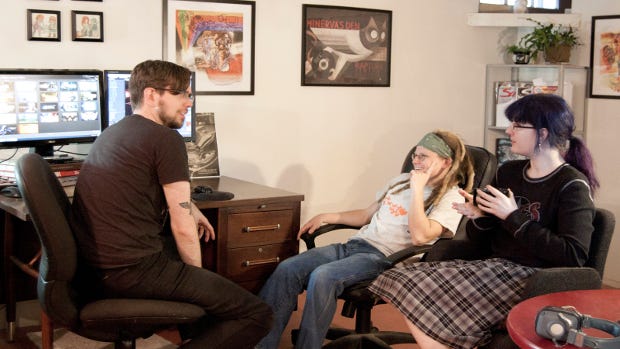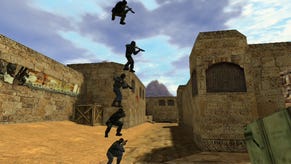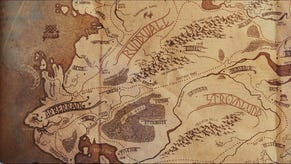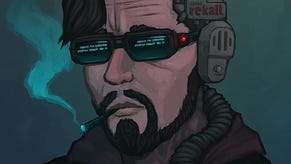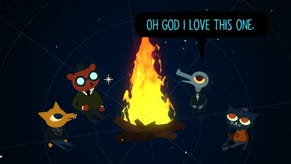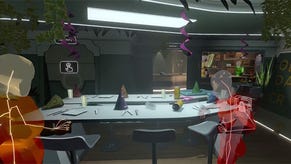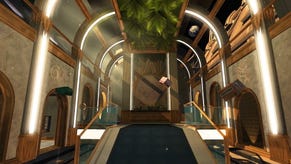Fullbright On Life After Gone Home, Their Next Game
Moving Out, Moving Up, Moving On
Gone Home was an inspired, beautifully heartfelt thing that clearly had a profound affect on people of multiple codes and creeds. It was powerful, delicate, and... we've probably said everything about it that it's possible for one website largely made up of hairy men to say. At some point, it becomes time to move forward and explore new territory. That's exactly what Steve Gaynor, Karla Zimonja, and the rest of the Gone Home team are doing right now: exploring. They don't know precisely what form their next game will take just yet, but in a lengthy (and frankly, often very silly) interview, they let me inside their creative process. Go below to find out what lies beyond Gone Home for the Fullbright Company.
RPS: Now that Gone Home has done so well, are you going to stick with the same team dynamic you have right now? Or are you thinking of adding any more people to your group?
Gaynor: We want to expand the scope of the next game slightly. We don’t want to limit ourselves to [the resources we had on Gone Home]. Gone Home is as much of a game as we were able to make with the number of people we had and the amount of time that we had, right? If we want to make something of a different scale, something is going to have to change. We could take four people and spend five years and make something way bigger. That doesn’t sound really interesting to me.
And also, with the people that we have, there’s only a certain number of disciplines that are represented. If we wanted our next game to be more than an environment that you explore… If you’re going to have characters, for instance, you gotta hire an animator. So we’re exploring what we want to do next, because we don’t want it to be the same thing. We don’t want it to be Gone Home in a different house or whatever.
RPS: Gone to a Different Home.
Gaynor: Actually, can we use that? That’s terrible. But yeah. We do want our next game to stand on its own and be a little bit more expanded of a production. But on the other hand, it’s not like we want to hire a team of 50 and become something that is totally divorced from what we’ve already done. It’s just, slow sensible expansion to support what we want to do next, I think.
RPS: Have you thought about a time period you want to set your next thing in?
Gaynor: I don’t think that we want to drift an enormous amount from Gone Home. I’m not personally real interested in setting something in the 19th or 23rd centuries. I think that there’s a ton of stuff to say that involves modernity – like, here’s an interesting way to have an interesting experience in a world you’ve actually lived in or are personally familiar with. I think that’s really interesting. But as far as what actual year it takes place in, yeah, we’re… No. The nice thing is, we’re still doing a lot of, basically, followup stuff from releasing Gone Home. We’re talking about what we want to do next, but we’re taking our time and not diving right back into building stuff and having to set things in stone. Yet. Until the other stuff slows down a bit more and we can give it our full attention. But discussions are happening. They’re all just still exploratory.
RPS: You say that you might look at the idea of putting characters in and stuff. I think that’s something that Gone Home sort of deftly sidestepped. A lot of the character work was in our heads, at least in terms of what characters looked like and stuff like that. I think the most egregious example I can think of recently was BioShock Infinite, where you had these characters who would talk and animate nicely, and then they would stop and just stare at you. Giant glassy eyes. It was terrifying. It was like, welp, I guess the theme park ride… It was like, have you ever been to Chuck E Cheese?
Gaynor: Yes. I spent most of my youth in a Showbiz Pizza, actually.
RPS: Right, they called them Showbiz…
Gaynor: Well, let me tell you. Showbiz Pizza actually ended up acquiring Chuck E Cheese, because Chuck E Cheese went bankrupt, and then the brand recognition of Chuck E Cheese was much bigger than Showbiz Pizza, so they turned all of the Showbiz Pizzas into Chuck E Cheese, even though they were the parent company that bought the mascot and all that other stuff. I have read the Showbiz Pizza Wikipedia page not too long ago, and I can tell you exactly about that.
Zimonja: A whole night’s worth of conversation about Chuck E Cheese.
Gaynor: It wasn’t that long. Maybe in your mind.
Zimonja: It was a whole evening! It was significant.
Gaynor: The end of the Showbiz Pizza Wikipedia article was talking about how they were Showbiz Pizza, then they bought Chuck E Cheese, then they turned all the Showbiz into Chuck E Cheese, except there were a couple of Showbiz Pizzas outside of the U.S. There were a couple of instances. One was in the United Arab Emirates for some reason. Another was in Kuwait, and it was burned to the ground during the evasion in the early ’90s. So Showbiz Pizza was a casualty of the first Iraq war. You’re transcribing that, right?
RPS: Absolutely. I can't not include this part. Scout's honor.
Gaynor: Now then. You were saying.
RPS: I was saying, it’s like when the animatronic Chuck E Cheese robot monsters would shut down and stare at you while the lights dimmed. It was like something out of a horror movie. How do you get around that? Aside from turning them into the enemy and, you know, murdering them. Which I would not mind if your next game is going to be about evil Showbiz robots.
Gaynor: I think that the idea of the uncanny valley and how you represent characters in games in a way that doesn’t step into that territory is a broad topic. Some of it is just… That’s the danger of going toward photorealism, or even pushed photorealism. Stylized, but they’re still clearly representative of humans.
There is no point where the Pixar characters stop doing their canned animation and start idling and staring into space. And so I think that you go along that spectrum, and I think that there are ways to have a human presence in a game without saying, okay, we’re just going to put a photorealistic representation, an animated mannequin in the same space as you, and your human brain is going to be able to decode that instantly as not a real person.
Zimonja: Basically, there’s a whole spectrum to the uncanny valley. Like, how much does this treatment look like a human being? How much does it act like a human being? That can be very broad, like you were saying. If it’s walking around and playing animations, and then all of a sudden it’s like, okay… I’m gonna wind down and sit here. In 2D animation, when… You know how, a lot of the time, when you see 2D animation, you can see the outlines vibrating a little bit? When that stops, that’s called dying. You let your character die. If you do that, it’s just frozen in space and dead. It sounds like what you’re describing.
Gaynor: There are examples in games, like in The Last Express, where they used rotoscoping, but they also just, for the most part, it was keyframes. They captured the essence of those characters being there, but not like, this is going to be an FMV game. Last Express came out at a time when FMV games were huge, and it was like, let’s just put video of people on screen. Clearly that approach, that literalism, which I think is what the 3D photorealism is about… That died out once people saw the limitations of it.
Whereas something like this sort of reduced animated non-literal approach, like The Last Express took, is really interesting. You get that feel of the expressions on the faces and the poses and everything, but they don’t sign up for, and we’re going to try to trick your brain into thinking this is really a person. It’s in that dialogue. It knows about your perception. It acknowledges that. I think that’s interesting.
RPS: So are you saying your next game is going to be an FMV game?
Zimonja: With David Bowie.
Gaynor: David Bowie was never in an FMV game, was he? Oh, well, he was in…
Zimonja: You can do it…
Gaynor: He was in fucking Giddidebleh: The Nomad Soul. The David Cage game.
RPS: Omikron, yeah.
Gaynor: Omikron: The Nomad Soul. But he wasn’t FMV in that, right? He was just a voice.
Zimonja: I feel like it was… I don’t know.
Gaynor: Christopher Walken has definitely done FMV. He was the main detective in Ripper. God. Who else? Oh, Dennis Hopper did an FMV game. That was around the same time that he did the Super Mario Bros. movie, so clearly…
Zimonja: A wonderful time.
RPS: [Quietly, gleefully watches the spectacle unfold]
Gaynor: Since this isn’t a podcast, I can take a second to google “dennis hopper fmv game” because I’m almost sure that I’m right.
Yes, Dennis Hopper was the lead investigator in the FMV game Black Dahlia.
Zimonja: There is absolutely FMV footage of David Bowie’s fucking face. I can see it.
RPS: You’re both right. This is great.
Zimonja: It’s on something like a monitor. Oh, God. Ugh. Amazing. You need to look at this image real quick.
[Everyone looks at Karla's phone.]
RPS: That’s really frightening.
Zimonja: Look at that face! It’s his whole face! Anyway.
RPS: Do you want to keep making games with a lot of reading in them? Obviously written language shows up in most games, but not anywhere close to the extent that Gone Home used it.
Gaynor: There will be probably some reading. There may be a lot. I just don’t know. I’m glad that we could rely on text a lot in Gone Home, and I’m glad that people wanted to read it, because yeah, here’s the pitch. Buy this game! There’s a lot of reading! It’s not intuitive, I think.
Zimonja: Reading in cursive, even.
Gaynor: A little bit of cursive. A little bit. You’re counting Carol’s handwriting and stuff. That’s a lot more legible than, like, Oscar’s. It was really important for us, because the game is about interacting with artifacts and finding expressions of these people’s experience in these bits and pieces that are physically in the house. It’s also not like a core value of mine. I’m not like, I must make games where you read a lot. But if we take Gone Home as a starting point and say, what can we add, what can we change, how can that foundation become its own experience the next time around, if it makes sense to say that you’re finding a lot of notes and stuff along with whatever else is going on, I’m not going to shy away from it.
I’m really grateful for the fact that people cared enough about the story and the experience to want to dig through all that text. I’m as susceptible as anyone to very low thresholds for text overload. But I think that, hopefully, what Gone Home shows is that what’s important is not necessarily how much text there is. There’s a limit. But more so, how relevant is it to the core of the player’s experience and what they need to understand and what is important to their being able to engage with the events of the world and everything? When there’s a ton of optional text, it’s just like, we put this text in and it’s just lore.
RPS: You said you don't way to stray too far from Gone Home overall, though. Have you thought about doing more… not even game-ey, but… just a more mechanically involved thing? Or is it still going to be mainly a story-focused experience?
Gaynor: The thing that I hope is meaningful about Gone Home is that you’re discovering content. It’s a content delivery mechanism. But all of the method for doing that is through systemic interactive tools. The game is about you being involved with discovering the story that lives in the environment, but it’s like, a mechanically driven game as far as how you do that – move around, be able to explore the environment as far as seeing around and under things and picking things up and examining them from all angles and moving physics objects around and locking and unlocking and the mini-map and all this stuff.
It’s story-based, but I still think of it as a game where a rich set of mechanics is integral to how it means anything. You could just put the text out there and just tell the story that way, but that’s not the point, right?
I think that on the one hand, I’m not real interested in making a game that’s about some things that are traditionally game-ey like win-loss conditions and combat and scoring and a lot of stuff that I guess is associated with mechanical progression or optimization or however you look at it. Competition? But that said, I think that our design approach is always to say, what kind of experience do we want to get across? And then how do we express that through these consistent interactive tools that the player has to be the driver of that?
It’s a line to walk, I guess, between… It’s not like I want to make a cover shooter or something. Or even something that’s less of an obvious straw man than that. Jonathan Blow is making The Witness, and it’s about exploration and atmosphere and everything, but it’s also very much about puzzle puzzles. That’s not something that personally excites me.
But, that said, I think that if we are going to expand our scope, if we’re going to get to a point where there are more kinds of stuff in the game, that’s all going to be expressed through… The player can do more things. The player interacts with the game differently, or in new ways, to support that, as opposed to just, we’re going to throw more content into it.
RPS: But the tale will still ultimately be a grounded, down-to-Earth sort of thing, correct?
Gaynor: It’s similar to the setting question. I think that there’s so much to talk about that is not fantastical, and that doesn’t rely on “He was dead the whole time!” Or the Usual Suspects thing was not supernatural at all, but it was an identity twist. It was, pull off the Scooby Doo mask, essentially, and all the pieces fall into place. I think that there’s a lot of ways to tell stories about things that happen in our own world that don’t rely on that kind of stage magician trick. You know? That’s interesting for its own sake. I think there’s a lot more that we could do with that. I’m interested in continuing to say, who are other kinds of people and other places and other times and other situations that we can make an interesting interactive thing about?
Zimonja: There’s a lot to be said for small personal stories. There really is. In any medium.
Gaynor: I’ve done a twist story, right? Minerva’s Den was totally an identity twist story. I’m happy with that. I’m proud of it. But also, it was very much within the conventions of the franchise we were working with. It’s something that the Shock games are good at, that we wanted to explore and see what we could do with. But I think that we have the ability to tell interesting stories without necessarily relying on those conventions.
I think that Karla and I feel like we are at the beginning of a path that leads to a lot of unexplored territory. We want to continue along it and see what we find, as opposed to really turning a corner 90 degrees and saying, let’s stop going that way and see what else is over here. I think there’s a lot more to uncover in that direction.
It’s one of those things where it’s not like I’ll ever shut the door. If we start writing the story and we get to it, and we’re like, it would be amazing if the blah blah guy been your dad and you never knew it… If that’s the thing that’s interesting, when you do it well, that’s just where we end up. But I don’t think that we’re starting from a point of thinking, and how do we make this all add up to an amazing twist? Or whatever. We try to start with as few assumptions as possible, aside from, who are these people and how can we do justice to them by telling a story about them?
Zimonja: Yeah. My favorite stories are… They’re contained more closely. You’re so in the world that the people the stories are about… When things happen to them, you are… It’s a bigger deal when real life things happen to them, than if werewolves came to the window and ruined everything.
Gaynor: I’ve used the metaphor, talking about Gone Home, where it’s like, the reason the events of the game matter is because the game allows you to build context for who these people are. You care about the events because, ideally, you care about the characters, not because the events themselves are so incredibly mind-blowing. It’s more like, I hope Sam’s okay. I want to find out what happened to her. I think that you feel that way about characters in a film or a novel or a game that you connect with, where you’re like, I’m invested in these people because I feel like I know them and understand them.
Zimonja: Not because the weight of the world swings in the balance or whatever.
RPS: Right. If that was the case, then every single story ever told would just be about the fate of the world, because there would be no worth in any other story.
Zimonja: That’s the only thing you’d care about. That society can go.
Gaynor: I think we’ll continue exploring that side of what we’re interested in and just start from there and see where it leads.
RPS: I'm pretty sure I've already figured out your next game. It's going to turn out that I was Christmas Duck all along.
Gaynor: Oh, that would be good. You go all the way through and at the end you meet somebody, and they’re like, "It’s you!" And in the first-person, you just hear…. Quack! And Christmas Duck just sits there.
Zimonja: That’s not what would happen. You’d have to… This is way better! Okay, you get the end of the game, and I don’t know… You walk into your office or something, you sit down, and your boss is like, "Good old Christmas Duck." He pats your head in first-person. It would be amazing. Maybe, I don’t know, he gives you a promotion.
RPS: And then David Bowie and Christopher Walken and everybody show up and say, "congratulations!"
Zimonja: And there’s a song about Christmas Duck.
Gaynor: Somebody did recommend that we release DLC where you play as Christmas Duck. It’s just pitch black, and you see a cabinet open, and somebody picks you up and takes a key and closes it again, and then the credits roll.
RPS: Thank you for your time.
